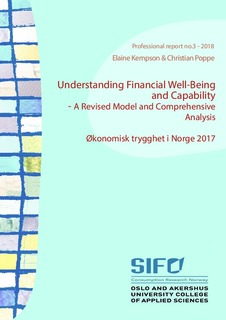| dc.contributor.author | Kempson, Elaine | |
| dc.contributor.author | Poppe, Christian | |
| dc.date.accessioned | 2020-06-21T15:28:51Z | |
| dc.date.accessioned | 2021-04-29T12:43:38Z | |
| dc.date.available | 2020-06-21T15:28:51Z | |
| dc.date.available | 2021-04-29T12:43:38Z | |
| dc.date.issued | 2018 | |
| dc.identifier.isbn | 82-7063-470-0 | |
| dc.identifier.uri | https://hdl.handle.net/20.500.12199/5357 | |
| dc.description.abstract | This report offers a working definition, a revised conceptual model and a comprehensive analysis of ‘financial well-being’. It builds on our previous study of the phenomenon ( Kempson, Kinney, Poppe, SIFO Project note 3-2017) and new and improved data from Norway 2017. The analysis presented in this report demonstrates that financial well-being is a meaningful overall concept that can be measured and identified by a set of determinants. Also, it has been shown that financial well-being can usefully be disaggregated into three distinct dimensions: meeting current commitments, being comfortable financially and having resilience for the future. It is shown that both overall financial well-being and its sub-dimensions are directly affected by three groups of variables: money use behaviours, financial confidence and control, and aspects of people’s social environment. In addition, important indirect effects from four other sets of indicators is identified: money management behaviours, financial attitudes, knowledge and experience, and personality traits. | en |
| dc.description.abstract | Denne rapporten handler om ‘financial well-being’ — økonomisk trygghet på norsk. Studien føyer seg inn i en fagtradisjon som omfatter begreper som ‘økonomisk integrasjon’, ‘financial literacy’ og ‘financial capability’, og er en videreføring av disse perspektivene på personlig økonomi i velferdsstaten. Analysene er en oppfølging av en tidligere rapport ( Kempson, Kinney og Poppe, Project note 3-2017), og er basert på et revidert spørreskjema og nye data fra 2017. Analysene som presenteres i denne rapporten viser at økonomisk trygghet består av tre ulike dimensjoner: at man kan ‘overholde forpliktelser’, at man er ‘komfortabel økonomisk’ og at man har en rimelig ‘økonomisk buffer overfor fremtidige hendelser’. Analysene viser også at økonomisk trygghet påvirkes direkte av tre grupper av variabler: måten man bruker penger på, grad av økonomisk kontroll, og egenskaper ved det sosiale miljøet. I tillegg har vi identifisert viktige indirekte effekter fra fire andre sett av indikatorer: økonomisk oversikt, holdninger til økonomi, økonomisk kunnskap og erfaring, samt personlighetstrekk. | no_NB |
| dc.publisher | Høgskolen i Oslo og Akershus | |
| dc.relation.ispartofseries | Professional report No. 3-2018 | |
| dc.subject | SIFO, PublikasjonSIFO, RapporterSIFO | |
| dc.title | Understanding Financial Well-Being and Capability | en |
| dc.type | Research report | |
| fagarkivet.author.link | https://www.oslomet.no/om/ansatt/chripo/ | |
| fagarkivet.source.pagenumber | 84.0 | |
